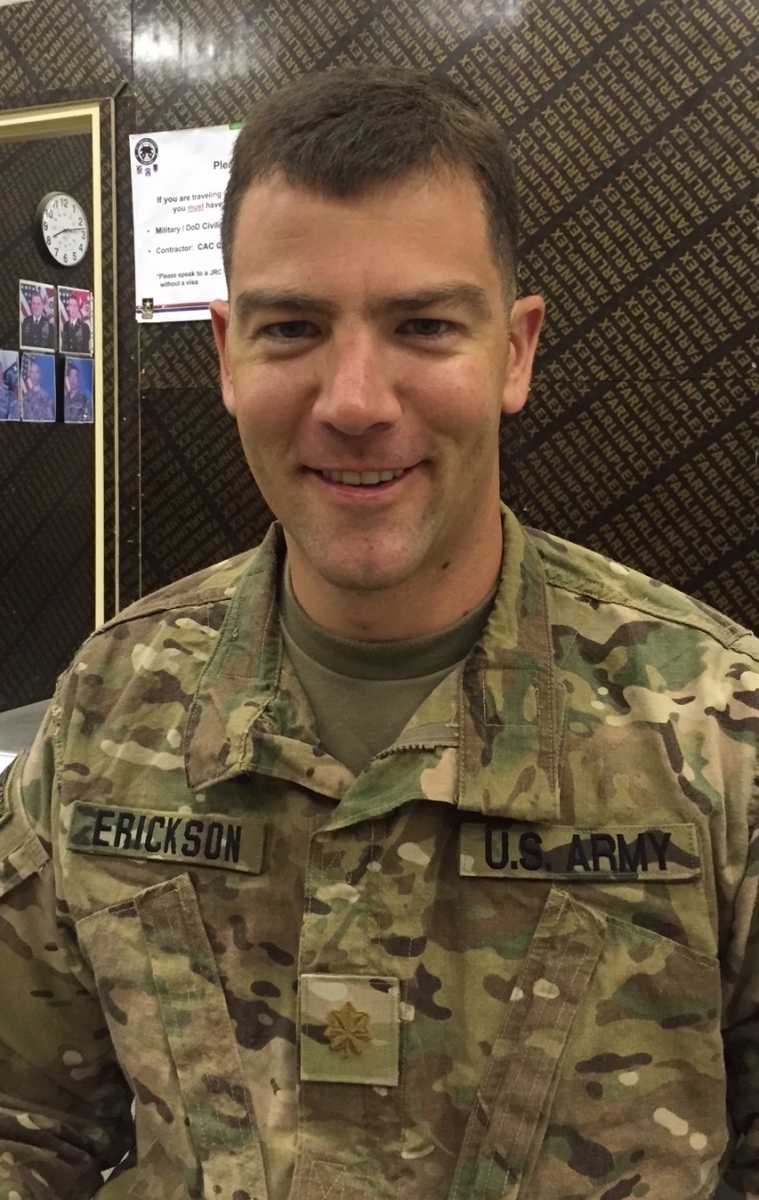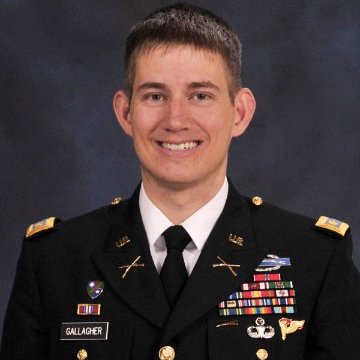Candidates for Princeton University’s Woodrow Wilson School of Public and International Affairs usually enter the School's degree programs with real-world professional experience. Students with military backgrounds also bring a global viewpoint of the effect public policy has on the ground. Their leadership and experience in the field enriches classroom conversations. Below are four profiles of these students.
Michael Kelvington
From the time he watched G.I. Joe cartoons as a child, Michael Kelvington MPA ‘17 felt compelled to join the military. In 2001 Kelvington followed that calling by attending West Point and then serving in the U.S. Army both in Iraq and Afghanistan.
But after learning about the General Wayne A. Downing Scholarship — which offers Army officers the opportunity to attend a fully funded graduate program — Kelvington decided to pursue his master’s degree. Today, he is a major and infantry officer studying international relations at the Wilson School. Attracted to Princeton’s diverse philosophical atmosphere, Kelvington was excited for a change of pace from his undergraduate experience at West Point.
“Princeton is the gold standard when it comes to policy schools,” Kelvington said. “I knew it was going to be a challenging atmosphere, both in terms of academics and adjusting my mindset from one for the military to one for the classroom.”
At the Wilson School, Kelvington has been able to learn the contextual theory behind much of what he has already seen at play in the Army, helping him to understand the structure of his job. He credits Princeton with helping him view policy and military strategy in a different light.
“Being at Princeton has changed the way I think and approach problems and has shown me how to build teams to come up with solutions,” Kelvington said.
As both an older student and an active duty soldier, Kelvington is eager to bring a diverse perspective to the Wilson School and hopes his presence will have an impact on his classmates during their future careers. Given the size of the U.S. Department of Defense, Kelvington knows many of his civilian classmates will go on to work alongside the military in some capacity; he hopes his time at the Wilson School will help foster mutual respect and understanding between military members and future policymakers.
After finishing his master’s degree in spring 2017, Kelvington will return to his position as an Army infantry officer in an operational unit, likely as an operations officer for either a battalion or a brigade in an infantry unit.
“An American soldier is the face of the United States’ foreign policy,” Kelvington said. “Development is important and institutions are important, but building those require security before they can take place. Often, the Army or the military in general provide assistance to facilitate these changes. It’s important to understand policy because we have to carry it out every day through orders, deployments and being ready to answer the call if something happens.”
Peter Erickson

Peter Erickson MPA ‘16 and U.S. Army major, has held a lifelong interest in the military. Growing up in a family that emphasized national service, the Army offered Erickson the value-driven career he sought, and between 2005 and 2014 he completed several deployments to both Iraq and Afghanistan.
Understanding the importance of a well-rounded soldier, Erickson decided to pursue his master’s degree at the Army’s encouragement. The Army offers many programs and incentives for officers to attend civilian graduate schools, aiming to give them academic experience working alongside current and future policymakers.
For him, the Wilson School seemed like the best choice. Like Kelvington, Erickson wanted to step outside of the military for a rigorous civilian education that would take him outside his comfort zone. Also like Kelvington, the Downing Scholarship provided the perfect opportunity for graduate education.
Erickson devoted his time at Princeton to absorbing as much information as he could find. “The biggest lesson I’ve learned is to always try and keep learning,” he said. “You’ve never arrived. It doesn’t matter what field or program you work in, you must always keep striving for more.”
Beyond understanding how policymakers think and value, Erickson also cultivated important relationships through the program, which he hopes to continue now that he has graduated. After completing his master’s degree last spring, he headed to Fort Hood, Texas, where he will work as a field grade officer with an infantry unit.
“The relationships you make with people are often more important than the subjects you’ll learn,” he said. “I feel like the friendships I’ve made here will carry me a lot farther than just the course material.”
Barrett Bradstreet

Barret Bradstreet Ph.D. ‘16 has always valued service, inspiring him to take advantage of a Marine Corps undergraduate scholarship that offered him the opportunity to combine his interest in helping others with a personal need to test his own limits.
After joining the Marines in 2002, Bradstreet completed several tours both across the Middle East and on naval missions. Eventually, he started teaching history at the Naval Academy. As a teacher, Bradstreet began to see firsthand the advantages of employing commanding military officers who obtained higher education degrees from civilian institutions and then applied that experience to military education and training facilities.
“I noticed that the officers' educations helped them not only connect to their troops, but also helped them make plans that were informed by historical and comparative experiences,” Bradstreet said. “I was impressed and inspired by what a handful of highly capable and trained leaders and energetic folks could do.”
When Bradstreet paired that inspiration with encouragement from both senior Marine Corps officers and a fellow military historian at the Naval Academy, he began seeking graduate education opportunities. No other active-duty Marine had ever earned a Ph.D. at the Wilson School, which motivated Bradstreet further.
His time at the Wilson School has reinforced the resistance to stereotyping Bradstreet developed while serving in Iraq. He has watched his own beliefs evolve with time and is grateful to both the Marines and Princeton for teaching him the value of open-mindedness and careful listening.
“It was my experience in Iraq in particular that understanding a complex social setting required a willingness to revise past expectations,” Bradstreet said. “The imperatives of military operations called for rapid decisions, but getting those rapid decisions right required intense curiosity and open mindedness.”
Today, Bradstreet supervises and directs Marine Corps recruiting in Phoenix and continues to feel inspired by his time at the Wilson School.
“Some of the Princeton faculty that I’ve worked with are impressive in ways I probably wouldn’t have even known to be impressed by when I started,” he said.
Brendan Gallagher

Brendan Gallagher, a second-year security studies Ph.D. student, is also an infantry major in the U.S. Army. Most recently, Gallagher served as the executive officer of an infantry brigade combat team in southern Afghanistan. Between 2003 and 2014, he completed seven deployments to Iraq and Afghanistan.
“For as long as I can remember, I’ve felt that public service is important, and I knew from a young age I wanted to do something in that area,” he said.
As a college freshman, Gallagher attended Reserve Officers' Training Corps (ROTC) events, which inspired him to the join the Army in 2001. Three months later, 9/11 happened.
“Since that point I never really made a conscious decision to stay in the military for a career, nor did I make a decision to leave,” Gallagher said. “But I’ve felt an obligation to do what I could to try to improve conditions in whatever places I’ve served.”
National security is important to Gallagher, and it’s what inspired him to seek his Ph.D. Earning a degree from the Wilson School ensures that Gallagher will be able to contribute, on a broader scale, to U.S. security.
“When it comes to national security issues, there are often human lives at stake, so I think it’s important to try to get those decisions right,” Gallagher said. “I hope the knowledge and understanding I’m gaining at the Wilson School can ultimately help inform decision-making and increase the likelihood of positive outcomes.”
Gallagher hopes that his academic efforts will contribute to security and strategy for the nation, with possible future placement in strategy at the Pentagon or a combatant command. In either case, he will carry the lessons from both Princeton and the Army, which have together reinforced the idea that in times of war and conflict, there are often no “right” answers.
“I’ve gained an appreciation that the design and implementation of national strategy is difficult, and success is almost never guaranteed,” Gallagher said. “Even smart people in power sometimes get things wrong, and seemingly ‘good’ decisions at the time may produce disastrous, unintended consequences. This underscores the importance of understanding the environment, and understanding and learning from the past as we move forward.”
Though representing diverse military branches and research interests, these four students all personify the University’s unofficial motto, “Princeton in the Nation’s Service and the Service of Humanity.” Through their simultaneous ventures of national service and personal growth through education, these four men enriched the Wilson School’s classrooms with their unique policy experiences and perspectives.

